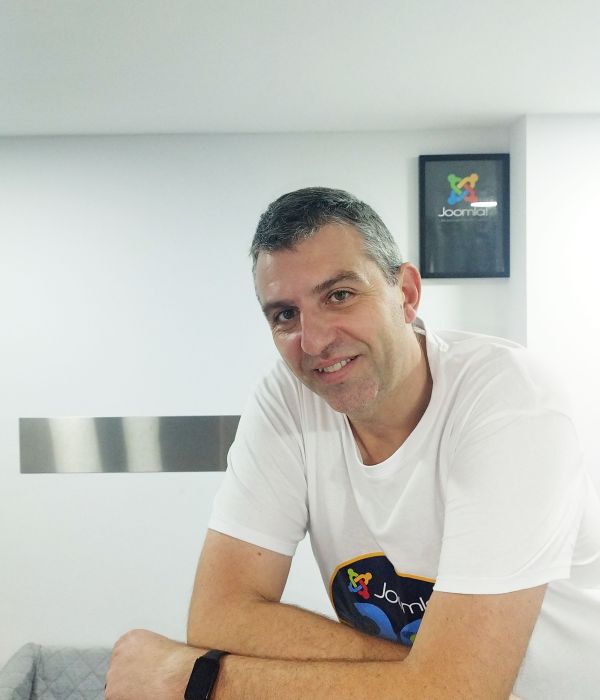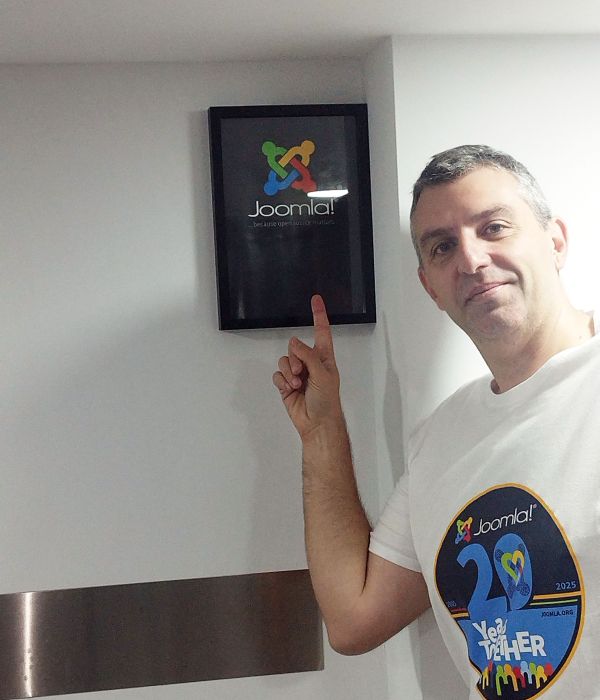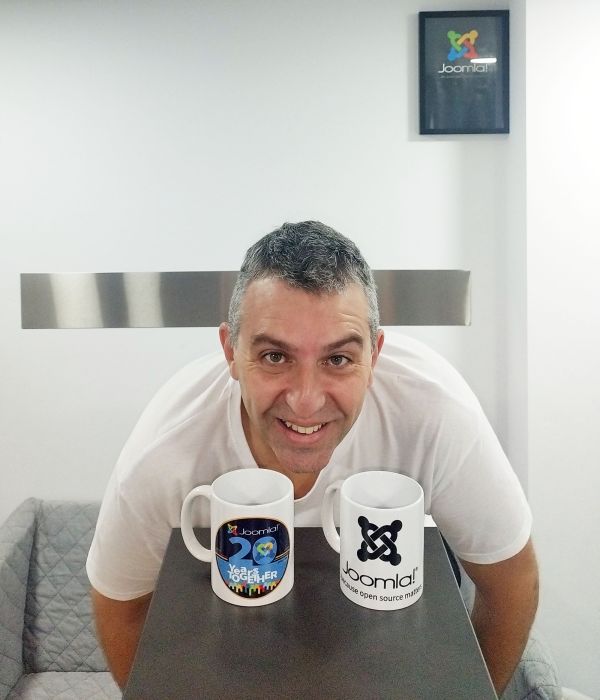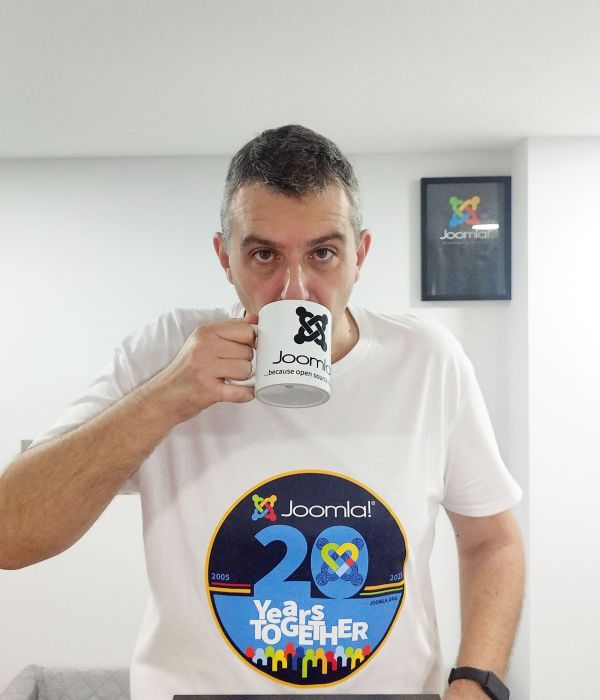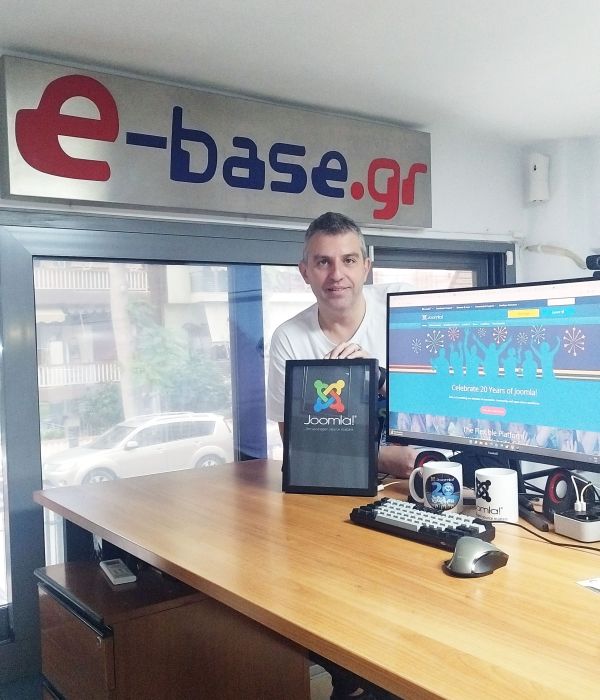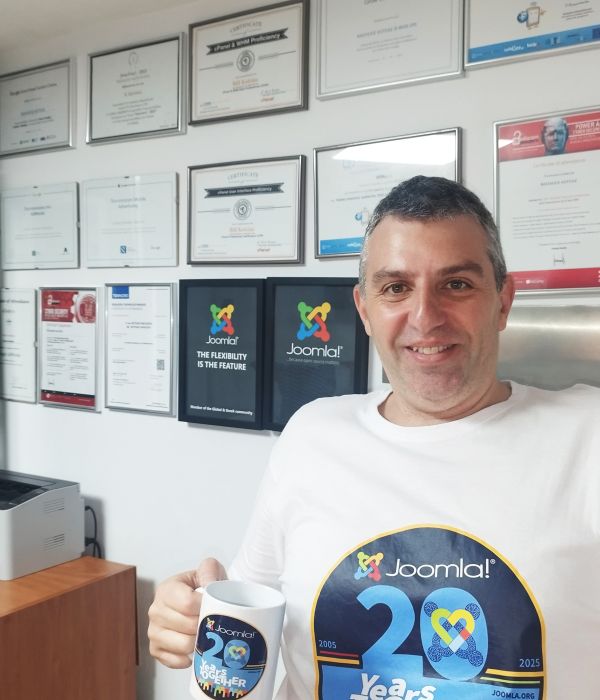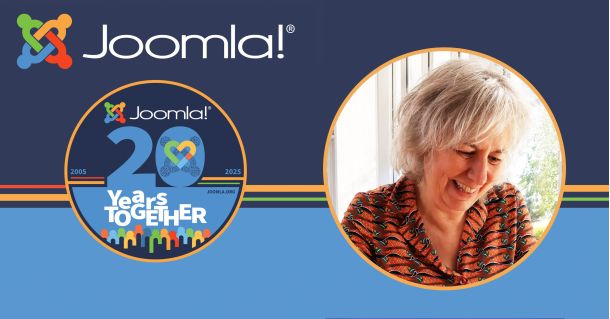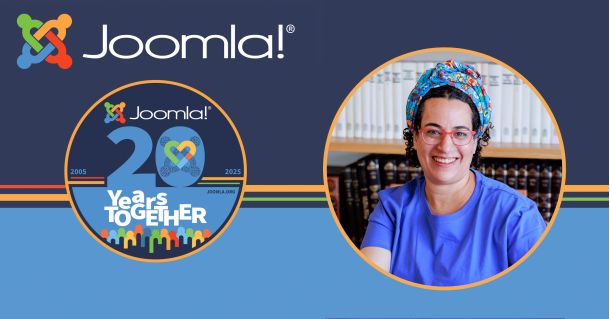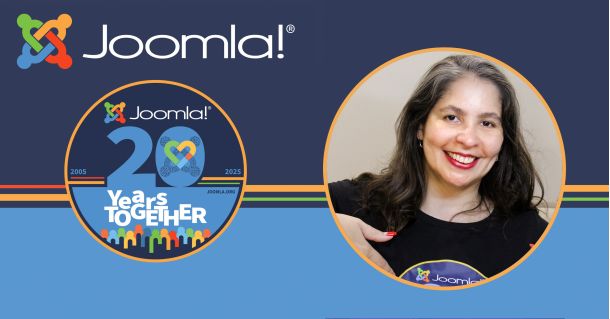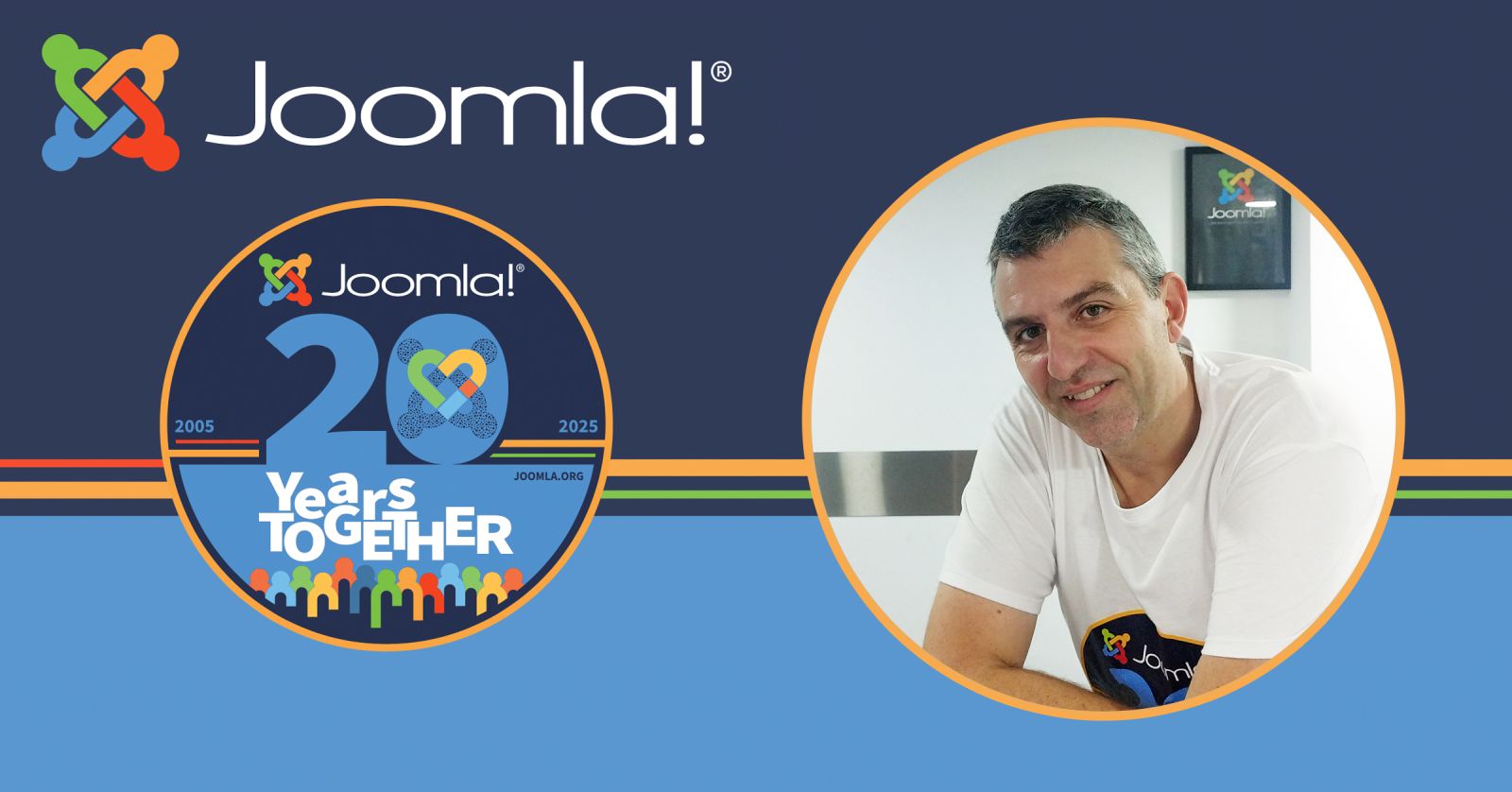
Joomla in Faces. Bill Kotsias (Joomla evangelist)
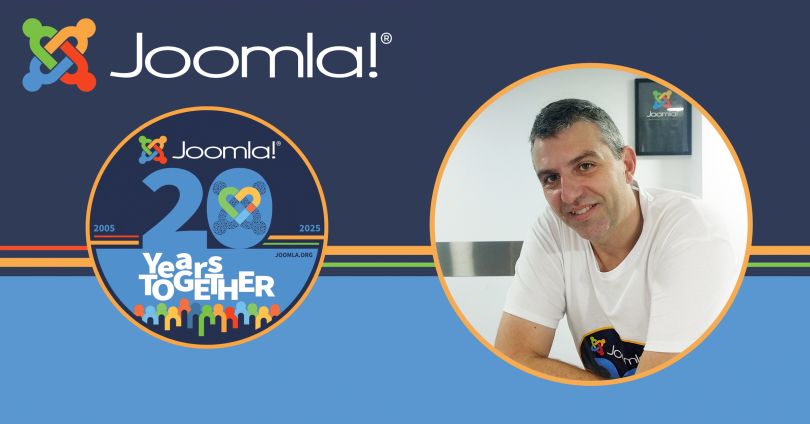
- Published: 11 November 2025
- Last modified: 07 January 2026


Meet Bill Kotsias, a dedicated Joomla advocate from Greece. He is the owner of a specialized development company, leading a team that builds projects of all scales exclusively with Joomla. Beyond commercial work, Bill is passionate about promoting the platform, actively introducing it to new audiences at events, seminars, and educational programs in schools, colleges, and universities across Greece. We sat down with Bill to discuss about his experience.
1. Please tell us a few words about yourself
My name is Bill Kotsias, and I own the company e-base.gr in Greece. The company consists of a team of programmers specialized in Joomla. We develop both small and large projects for clients exclusively using the Joomla software.
We maintain a privately owned data center in Greece, where we host all the projects we build. This hosting environment is fully optimized specifically for Joomla. All our proposals and offers to clients are based entirely on Joomla. We do not undertake any work that does not involve this software. That is why we are among the few companies in Greece that specialize exclusively in Joomla.
2. Your first encounter with Joomla: how did it happen?
My first contact with Joomla was around 2007, when I needed to study which CMS was the best for website development. At that time, the transition from Mambo to Joomla was taking place. After conducting several tests with various open-source platforms, I concluded that Joomla was the best option, both for beginners and for users with programming knowledge. If someone had programming skills, they could extend Joomla as far as they wanted.
3. Have you worked with other Content Management Systems besides Joomla?
I have, but nothing worked like Joomla does. I have experimented with other CMS’s to see if they were as flexible, but the rejection was almost immediate. Most alternatives are either much more complicated for the end user or require significantly more work hours to achieve results that we can easily reach with Joomla. That makes them inefficient and unprofitable, both for our company and for the client.
4. How do you contribute to the Joomla community?
Yes, I’ve been an active member of the Joomla community for over 12–13 years, along with my team.
We contribute in various ways, primarily by promoting the software through events, seminars, presentations at colleges, schools, and universities, as well as through client training sessions when requested.
We also participate in the global Joomla community, through the official forum and communication channels such as RingCentral and Mattermost.
Additionally, we take part in translation teams and remain open to supporting any initiative or contribution needed by the international community.
5. What motivates you to do this?

What motivates me is the fact that Joomla was created by volunteers, and we want to give back to the global community in the same spirit, contributing however and whenever we can.
Bill Kotsias
What motivates me is the fact that Joomla was created by volunteers, and we want to give back to the global community in the same spirit, contributing however and whenever we can. Just as volunteers dedicate their time to release software that reaches end users and makes their work easier, we also try to reciprocate that effort.
We believe that with our contribution, combined with that of the global community, Joomla will soon become the number one web development platform, used by people worldwide.
6. Joomla in Greece. Could you introduce your community, please?
The Joomla community in Greece was founded around 2006 by Aris Datsis, who, sadly, is no longer with us. He was the person who managed to bring together professionals in Greece who were working with Joomla, uniting them with the goal of promoting the software in our country.
For many years, along with other colleagues, freelancers and company owners like myself, we have been meeting regularly, both in person and online.
We hold discussions and create channels to promote Joomla, such as collaborations with universities, advertising campaigns, and participation in IT exhibitions across Greece.
Our goal is to continue spreading Joomla within the country and establish it as a key tool for website development.
7. Is it possible for foreign 3rd-party developers to collaborate with the Greek community (e.g., on tutorials, product translations, announcements, etc.)?
Of course it is. We are always open to having foreign developers or even regular Joomla users contact us so we can organize a joint presentation, either online or in person. It has long been a shared vision for us, as the Greek community, to participate alongside international developers in an overseas conference, so that both Greeks and foreigners can co-host a lecture about Joomla.
8. According to your recent interview for the JCM, about 30-40% of websites in Greece are made with Joomla, compared to other CMSs. How do you think Joomla achieved this position?
I believe this is mainly due to us professionals who, in our daily work, develop client projects using Joomla.
Some clients may understand this choice, others may not, but everyone is satisfied with the final product. It’s user-friendly and functional, and that’s what led to Joomla powering about 30–40% of Greek websites.
I also believe that if Joomla continues to expand, which requires proper education, both for businesses seeking our services and for public institutions, then over time we could reach nearly 100% adoption, with almost everyone using Joomla.
9. What was your Joomla session in the university about?
My role was to explain, within the limited time available, the basic principles of Joomla and to help attendees understand that it is a secure, flexible, and easy-to-use platform. What my main takeaway for audience was that in less than five minutes, someone can have a fully functional website online.
10. You gave a session about Joomla at a university. Was this a one-time event, or do you plan to speak at different universities on a regular basis?
No, it wasn’t a one-time event. It’s something that happens two or three times a year, either at universities, schools or businesses, as part of employee training or educational initiatives. We organize these events periodically throughout the year.
Unfortunately, it’s not always in our hands to make them more frequent, partly due to lack of time and partly due to limited cooperation with public institutions. Nevertheless, we try every year to do the best we can.
11. Do you plan to give more talks at the universities you've already visited, covering different topics about Joomla?
Yes, of course. Both in universities and other institutions, we aim to return every two to three years with updated presentations. This way, we keep the same organizations informed about the latest Joomla developments and ongoing advancements, without overloading them with too frequent sessions.
12. How did you get the university interested in hosting your session?

Joomla is a powerful and evolving platform, and its growth depends on collaboration among everyone: developers, educators, and institutions.
Bill Kotsias
This is made possible through organizations such as FOSCOM, an annual student-led conference held at universities across Greece. Through such events, interest in open-source software emerges. And Joomla, being one of the leading open-source platforms, naturally becomes part of those initiatives. That’s how we get the opportunity to participate and present Joomla in academic settings.
I would like to emphasize that Joomla is a powerful and evolving platform, and its growth depends on collaboration among everyone: developers, educators, and institutions. The more people get involved, the further Joomla will spread, both in Greece and internationally.
13. Attracting new users to Joomla is an important goal, and speaking at universities is a significant step to expand Joomla's reach. What else should Joomla teams and volunteers do to achieve this?
First of all, volunteers need to continue the excellent work they have been doing for years and never stop.
Secondly, it is extremely important to reinstate the official Joomla certification in every country through the international community. There should be examinations where interested individuals can participate and earn that certification. We strongly insist on this point, because it is crucial that clients and institutions attend lectures and talks delivered by people who hold an official certification. This way, even if they are not familiar with Joomla, they will understand that the speakers truly know the platform in depth.
In addition, volunteers should organize global meetings from time to time, each time in a different country. Just as we, the Greek community, do with our annual university lectures, held in a different city of Greece each year.
Through such efforts, we can achieve Joomla’s worldwide expansion and introduce it to audiences who either don’t know it yet or use other software — when, in fact, they should be using Joomla.
14. What key advantages of Joomla would you highlight?
Joomla’s advantages are its flexibility, security, and of course its open-source nature. A developer can use it to build anything, from a simple website to a highly demanding project, without any issues.
When Joomla is properly set up and developed, with the right server optimization, it can be extremely lightweight and fast. The end user, whether a small business or a large organization, ends up with a truly powerful tool at their disposal.
15. Joomla turns 20. What are your thoughts on this milestone?
Honestly, it’s amazing how quickly the years have passed. It feels like just yesterday when Joomla was taking its first steps. From the beginning, it showed great potential, but no one could have imagined it would reach the level it’s at today, offering outstanding security, ease of use, and the ability for anyone to utilize it effectively.
I hope that Joomla continues to evolve for another twenty, thirty, even fifty years, becoming the number one software platform worldwide, built on modern technologies and advanced code. In today’s digital age, Joomla truly has the potential to be an essential tool for everyone who works online.
